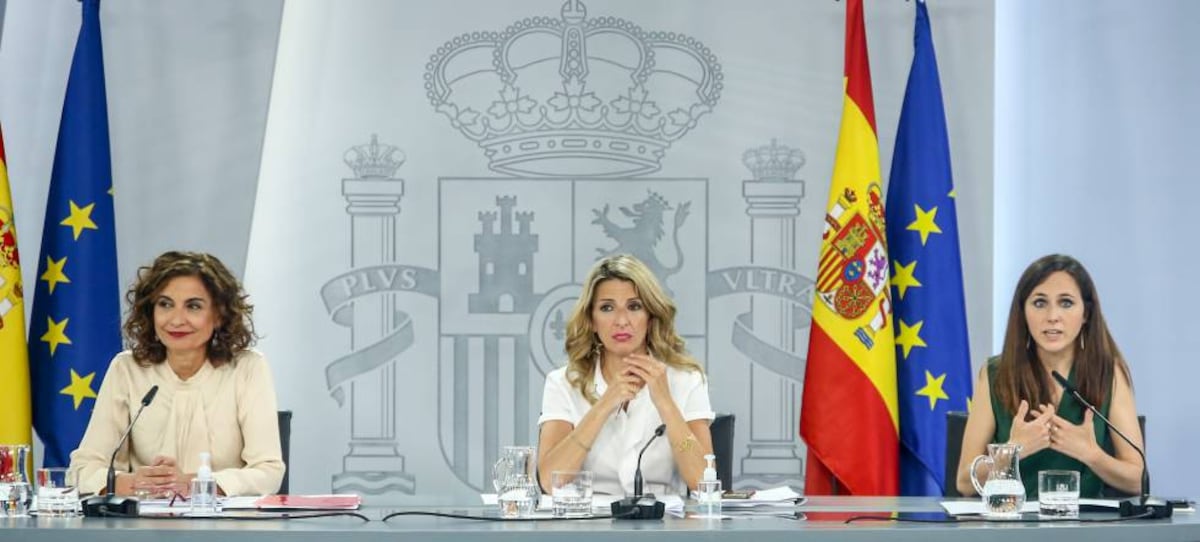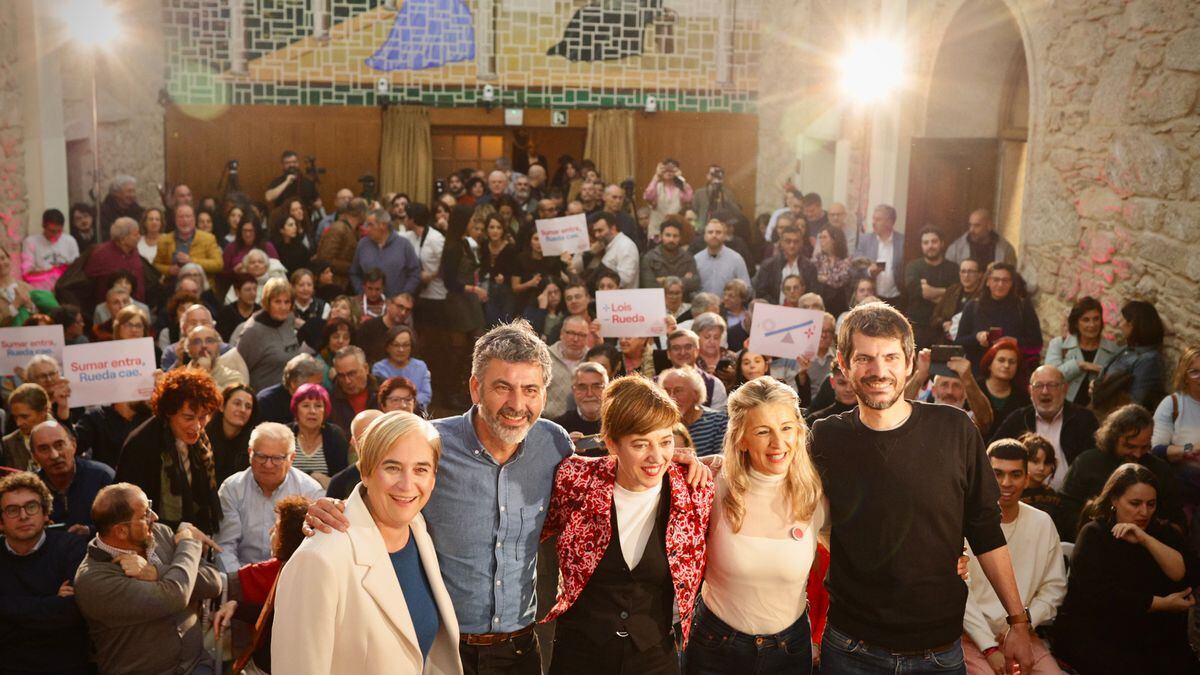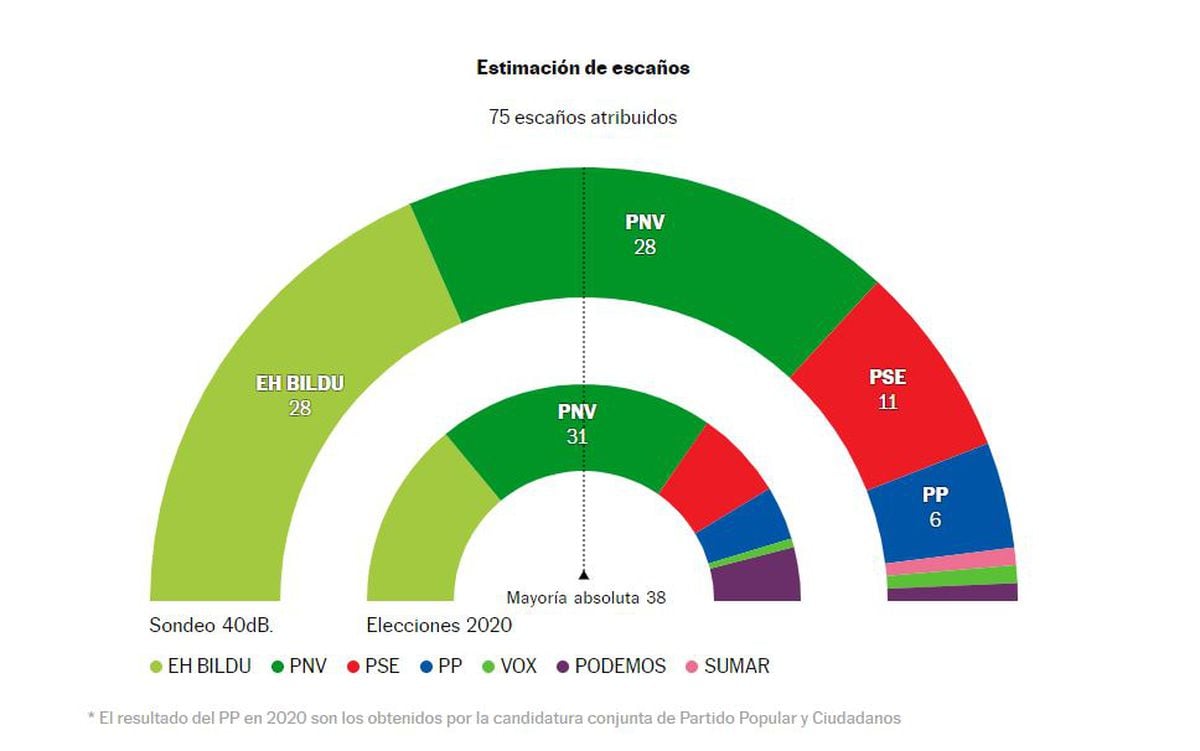The PP will win the general elections on July 23, but could not govern if Yolanda Díaz managed to group Podemos in Sumar, according to a poll by the 40dB institute. for EL PAÍS and Cadena SER. The survey, with a sample of 800 interviews, was conducted between May 31 and June 1, after the regional and municipal elections, and handling both scenarios: that of the union and that of the fragmentation of the left. If Sumar and Podemos ran separately in July, the PP and Vox would add 177 seats, one more than those that mark the absolute majority in Congress, while the PSOE would stay at 111, Sumar at 22 and Podemos at 3. If they went to the polls together, the right-wing bloc would add 169 representatives, which if the UPN seat is added would be 170, and the left would gather 148. The socialist leader, Pedro Sánchez, could be invested by a simple majority (more yeses than noes) in the second vote gathering the support of at least 23 other deputies. The only formula to achieve this without the support of Bildu (which according to the poll, would obtain 4 seats on 23-J) would be adding the votes in favor of ERC (9), Junts (8) and PNV (6). Sumar and Podemos have only four days to close a deal. You can check all the survey data here.
More information
The resources of the PP and Vox before the Constitutional anticipate their counter-reform if they govern
In a scenario of union of the brands to the left of the PSOE, the PP, which brings together most (53.9%) of the vote of Citizens in 2019 – the party has renounced to compete in these generals after successive electoral failures – would win the elections with an estimated 32.3% of vote, 11.3 percentage points more than in the 2019 elections, while the Socialists (27.2%) would lose one point from the previous general elections. Sumar and Podemos would together gather 15.6% of the vote and displace Vox (13.6%) as the third political outside in Parliament.
In this scenario of union of the left, the PSOE reduces its transfer of votes to the PP (6.6%), almost 8% of its support in 2019 would now choose the option Sumar and Podemos, and 6.4% are undecided. The flight of support from the PP to Vox stands at 9.5%. The party of Santiago Abascal would also take 10.6% of the former voters of Ciudadanos. Among those who in 2019 chose the ballot of Unidas Podemos, 77.5% would now choose that of the coalition with Sumar, 13.1% would prefer the PSOE and 4% still do not have it clear. In the case of the voters of More Country, already integrated into the brand that will lead Yolanda Díaz, 63% would opt for Sumar and Podemos and 24.4% would support the Socialists. If the left went to the polls divided on July 23, there would be more socialist voters in 2019 who would now opt for the PP (7.2%) than for Sumar (5.4%) and Podemos. Those who in the last elections supported the party then headed by Pablo Iglesias would distribute their votes as follows: 24.9% would choose Podemos, 42.8% would prefer Sumar and 18.2% would opt for the PSOE.
The demobilization of the left
The poll shows that the right is much more mobilized than the left. The percentage of the general population that says they will vote safely on July 23 is 58.5%. Among those who in 2019 chose the PP, it rises to 75.1% and among those who chose the Vox ballot, to 80.7%. Meanwhile, only 61% of those who opted for the PSOE in the previous general elections say they will vote safely, although the percentages rise significantly among those who then voted for the brands to their left: up to 77% of mobilization in the case of those who opted for More Country and up to 74.1% among those who preferred Unidas Podemos. The experts consulted by EL PAÍS believe that one of the main objectives of the electoral advance announced by Sánchez last Monday is precisely to combat that demobilization of the left-wing electorate after the electoral overturn of the municipal and regional elections, propitiated, to a large extent, by the fall of Podemos, which can only aspire to revalidate its presence in one of the six autonomous governments of which it was part: Navarre.
The PSOE wants to take advantage of the negotiation of post-electoral pacts between the PP and Vox to encourage its political space to go to the polls to avoid a government of the right and the extreme right in Spain. The British newspaper The Guardian signed an editorial on Thursday in which it ensures that Europe as a whole needs Sánchez's "move" to go well so that the radical right does not colonize another government. Aware of these speeches, the PP tries to postpone the negotiation of the pacts with Vox so that it does not affect its results in the July generals, but the municipalities are constituted on June 17 and the regional parliaments, from the 13th of that month. As he did after the elections of Castilla y León, the first Government in which Vox is present, thanks to a pact with the popular, Alberto Núñez Feijóo insists that the territories decide. But as leader of the PP he could veto agreements with the extreme right and in any case, express his opinion on the matter, something he has not done beyond saying that he aspires to govern alone.
Despite the recent institutional shift after the regional and municipal elections of May 28, in which seven of the 10 communities presided over by the PSOE can move to the right, the average of the population stands at 4.9 in the axis of ideological self-location, being 0 the extreme left and 10 the extreme right. The PSOE has lost 403,741 votes in the local elections, but the fall of the brands to its left and the improvement of the results of the PP by swallowing Ciudadanos have opted for numerous governments on the side of the right. The extrapolation made by EL PAÍS from the results of 28-M to the general elections applying the D'Hondt method also indicated that Alberto Núñez Feijóo would be guaranteed victory on July 23, but not the Government.
Sheet:
Ambit: Spain. Universe: general population resident in Spain (except Ceuta and Melilla), from 18 years of age and with the right to vote. Sample size: 800 interviews. Procedure: online interview (CAWI). Sampling error: +-3.5% (for 95% confidence). Date: from May 31 to June 1, 2023



/cloudfront-eu-central-1.images.arcpublishing.com/prisa/QN6ATYYNOFBQVD5UUS6DW347SM.jpg)





